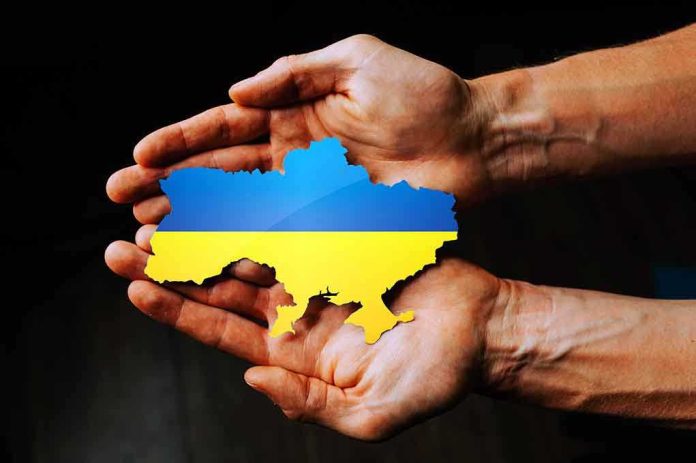
Russia has forcibly abducted over 35,000 Ukrainian children and is now systematically erasing their cultural identity through military training camps and forced adoptions.
Key Takeaways
- An estimated 35,000 Ukrainian children have been abducted by Russia since the 2022 invasion, with the Kremlin claiming the number could be as high as 700,000.
- Children as young as four months old have been taken from orphanages, battlefields, or directly from families and subjected to “Russification” programs.
- The International Criminal Court has issued arrest warrants for Vladimir Putin and Russia’s Children’s Rights commissioner for war crimes related to child deportation.
- Only 1,366 children have been returned to Ukraine despite international pressure, as Russia uses them as bargaining chips in negotiations.
- Experts compare this to Nazi Germany’s Germanification of Polish children during World War II, calling it potentially the largest wartime child abduction since that era.
Systematic Abduction Campaign
Since the Russian invasion of Ukraine began in February 2022, President Putin’s forces have engaged in a massive child abduction campaign targeting the most vulnerable Ukrainian citizens. Children have been taken from care homes, battlefields, and directly from their families in occupied territories including Luhansk, Donetsk, Zaporizhzhia, and Kherson. Some were orphans, while others were separated from their parents during evacuation attempts or tricked into going on “school trips” to Crimea, never to return. The scale of this operation is staggering, with Ukrainian authorities estimating at least 35,000 children missing.
“At least 35,000 Ukrainian children are believed to be missing–abducted by Russian troops and forced into indoctrination programs since the start of the Kremlin’s brutal three-year invasion,” according to Ukrainian authorities.
More alarmingly, Russian state media has openly boasted about what they euphemistically call “rehoming” Ukrainian children, with the Kremlin claiming to have taken as many as 700,000 children. Moscow presents these abductions as humanitarian rescues of abandoned children, despite overwhelming evidence that many were forcibly separated from living parents or relatives. This systematic targeting of children represents a deliberate strategy to undermine Ukraine’s future by removing its youngest generation.
Forced “Russification” Programs
Once in Russian custody, Ukrainian children are subjected to intensive “Russification” programs designed to strip away their Ukrainian identity. The Yale Humanitarian Research Lab has identified at least 56 camps across Belarus, Crimea, and mainland Russia where these children are held. In these facilities, children are forbidden from speaking Ukrainian, forced to learn Russian, and compelled to sing the Russian national anthem. Those who resist face punishment, while compliance is rewarded with privileges. This cultural erasure represents a direct assault on Ukraine’s national identity.
“It’s believed the kids captured have been forced into ‘Russification’ programs— kept in so-called ‘re-education camps’,” according to experts at the Yale Humanitarian Research Lab.
Even more disturbing, Russian state television has broadcast footage of Ukrainian children being trained to assemble and fire assault rifles at military boot camps. Children who have managed to escape or be rescued report receiving military training while in Russian custody. This militarization of abducted children represents not just cultural erasure but potentially preparation for future conflict against their homeland. Russia’s actions mirror historical atrocities that have been universally condemned by the international community.
War Crimes and International Response
The International Criminal Court has recognized the severity of these actions by issuing arrest warrants for both Russian President Vladimir Putin and Maria Lvova-Belova, Russia’s Children’s Rights commissioner, who has publicly boasted about adopting a child from Mariupol. These warrants specifically cite the unlawful deportation of Ukrainian children as a war crime. Legal experts have drawn direct parallels to one of the darkest chapters in European history, noting the similarities to Nazi Germany’s systematic abduction of Polish children during World War II.
“This is likely the largest child abduction in war since World War Two – comparable to the Germanification of Polish children by the Nazis,” said Nathaniel Raymond, executive director of the Yale Humanitarian Research Lab.
Raymond further explained the legal implications, stating: “Taking a child from one ethnic or national group and making them part of another ethnic or national group – that’s a war crime.” Despite these clear violations of international law, the return of these children remains complicated. The Kremlin refuses to provide a list of names of abducted children and uses them as bargaining chips in negotiations with Ukraine. This politicization of child welfare represents a cynical exploitation of innocent victims for geopolitical advantage.
Limited Returns and Ongoing Challenges
Despite intensive efforts by organizations like Bring Kids Back, only 1,366 children have been returned to Ukraine so far. The fate of the remaining tens of thousands remains uncertain, with many feared to have disappeared into Russia’s adoption system or been placed with Russian families. Once children are integrated into Russian society, locating and identifying them becomes increasingly difficult. The Kremlin has strategically dispersed these children throughout Russia’s vast territory, further complicating recovery efforts.
“These are our children, they are Ukrainian and they have to be brought home. Russia doesn’t have any right to them,” said Ksenia, a Ukrainian advocate working to recover abducted children.
President Trump’s administration now faces the challenge of addressing this humanitarian crisis while navigating complex geopolitical relationships. Though funding for Yale’s Conflict Observatory was terminated, diplomatic efforts to secure the children’s return must continue. The abduction of Ukrainian children represents not just a war crime but a long-term strategic attempt to undermine Ukraine’s future by removing its youngest generation. Without strong international intervention, thousands of Ukrainian children may permanently lose their heritage, identity, and connection to their homeland.













